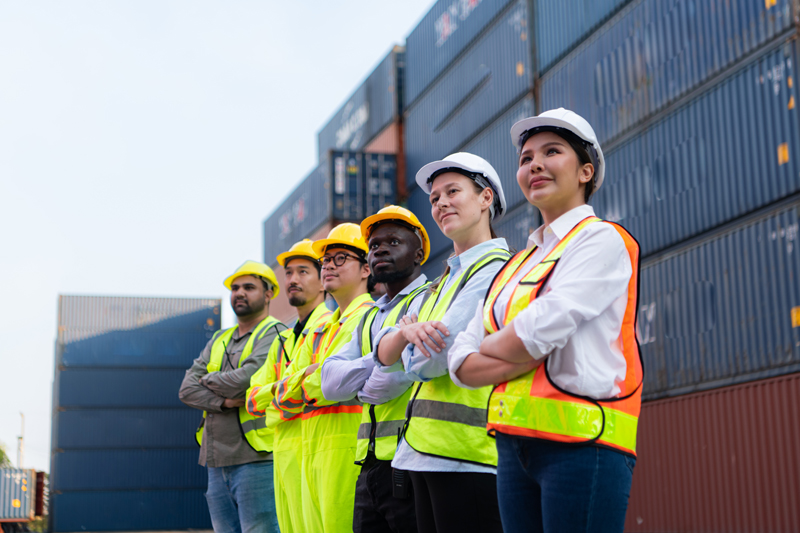Your guide to freight forwarding in 2024
As experts in insurance for freight forwarding businesses, we need to be familiar with every aspect of a freight forwarders role. So what, exactly, does a freight forwarding agent do? Read on to discover what this crucial job involves.
What is a freight forwarder or forwarding agent?

A freight forwarder is either a person or company that organises shipments on a shipper’s behalf. For a fee they liaise with the carrier or carriers, in other words the people who actually transport the cargo. The forwarder basically acts as an agent to the logistics network. As an official agent they’re legally recognised as someone who has the power to act on the behalf of another person or an entity, in this case the shipper. Carriers can use any kind of transport to get their customer’s cargo from A to B in the quickest, most efficient and cost effective way: by ship or plane, lorry, tanker, or rail. Usually it’s more than one method, especially when a shipment is headed for another continent. A freight forwarder might arrange for the cargo to travel from the factory where it was manufactured to the nearest airport by truck, then onwards by plane to a convenient port, then taken by sea to its final destination, where it’s loaded on board another truck for delivery. As you can imagine things can get complicated, which is why the role is so important.
If it’s an international cargo, an international freight forwarder will handle to job using their expertise to prepare and process the customs documents and other vital paperwork correctly. They’ll perform the all-important task of reviewing the commercial invoice, and checking the export declaration generated by the shipper. They will make certain the bill of lading is right and all the other documents relating to the carrier, the exporting and importing countries, and the trans-shipment of the goods are completed properly. Trans-shipment is important because every port isn’t directly connected, which means cargoes often get sent to intermediate destinations before being sent onwards to their final destination. Even if it’s possible to ship a cargo direct from port to port it can be cheaper to trans-ship than send goods direct, ideal when the cargo isn’t time-sensitive. Either way, modern freight forwarders offer an end-to-end process. Today’s digital Freight Tracking Technology means forwarding agents can check their cargoes’ information in real time, updating clients as the journey progresses. We wouldn’t be surprised to see more InsurTech innovations being created to support this important role in future.
About FIATA
FIATA, the International Federation of Freight Forwarders Association, is an independent member organisation representing freight forwarding experts in more than 150 countries. There are currently around 114 Associate Members and more than 5,500 Individual Members, together representing at least 40,000 freight forwarding and logistics companies across the globe. Tasked with creating workable international policies and regulations governing the logistics sector, they support and promote best practice. They even engage with global bodies like the World Trade Organization, United Nations and others to protect the interests of the sector.
The challenges faced by freight forwarding in 2024

As we’ve mentioned when talking about InsurTech, the forwarding sector is changing fast at the moment. But the changes are about much more than technical and digital solutions alone. War and growing conflict in the Middle East isn’t helping matters, nor is the ongoing war in Ukraine. At the moment experts are keeping a close eye on the situation in the South China Sea, where clashes have taken place between Chinese ships and vessels from the Philippines. Some are worried the situation will escalate. The climate is changing faster than ever, bringing with it more risk of extreme weather events out on the seas and oceans. This is making voyages riskier. More businesses and individuals than ever are demanding greener, more eco-friendly solutions to freight forwarding. Sustainable logistics is hot news, and new regulations around pollution, fuels and responsible practices are on the cards. AI is definitely going to play a bigger part. When used wisely it can improve operational efficiency and also boost the quality of customer service. But there’s a delicate balance between digital and human, and there’s a risk that unwise use of AI could send service levels plummeting. The human factor still matters and always will.
At the same time the sector faces intense competition, with ocean fleets not being expanded fast enough to meet growing demand. This is going to require significant innovation and imagination to overcome. The industry has been consolidating for some time now, already beginning to change the competitive landscape. Shippers and forwarders are finding new ways to survive and grow by buying each other out and creating innovative new partnerships.
Wishing you a successful 2024
Whatever happens in 2024, we’d like to wish all of our freight sector clients a happy and successful year. We’ll be on your side whatever happens, providing the financial protection you need to relax and know you’ve done the best possible job.
Sources
NOT UP-TO-DATE WITH OUR MONTHLY ARTICLES? FIND ISSUES HERE
LITHIUM BATTERIES - MARINE INSURANCE COMPANY EXPERT OPINION
ABOUT REINSURANCE IN MALAYSIA - INSURANCE FOR INSURERS
SHIPPING COSTS, THE RUSSIA EFFECT, EV FIRES AND GROUNDINGS
HOW TO INSURE YOUR GOLD AND SILVER BULLION COLLECTION
OUR BEGINNERS GUIDE TO FREIGHT FORWARDERS LIABILITY INSURANCE
OUR FINGER ON THE PULSE - THE WORLD'S FREIGHT FORWARDING NEWS
BECOME AN INSTANT SHIPPING CONTAINER SEALS EXPERT
THE 12 DAYS OF CHRISTMAS
EVENT INSURANCE WHAT IS IT AND WHY YOU NEED IT
AUTO SECTOR BEST BUSINESS INSURANCE ADVICE
